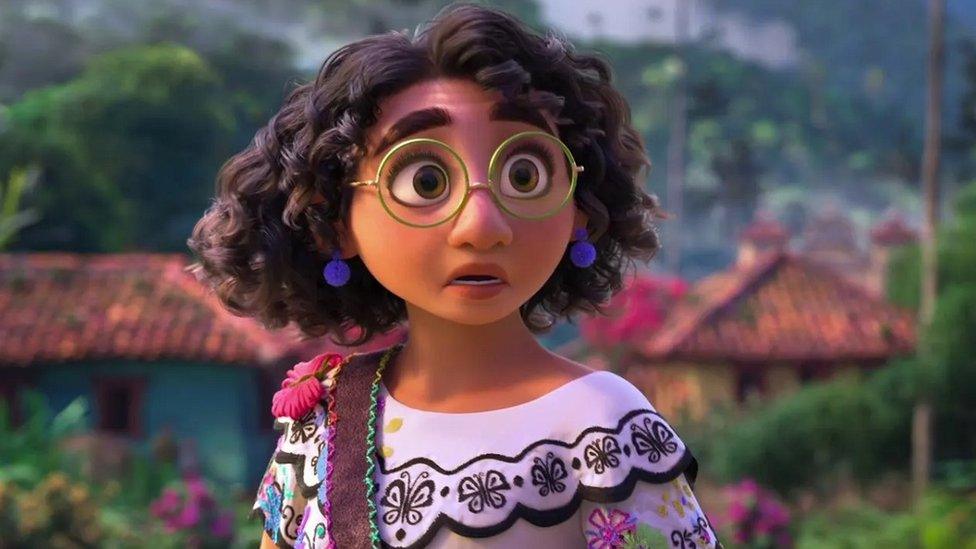Oscars: How Encanto composer Germaine Franco is smashing the glass ceiling
- Published
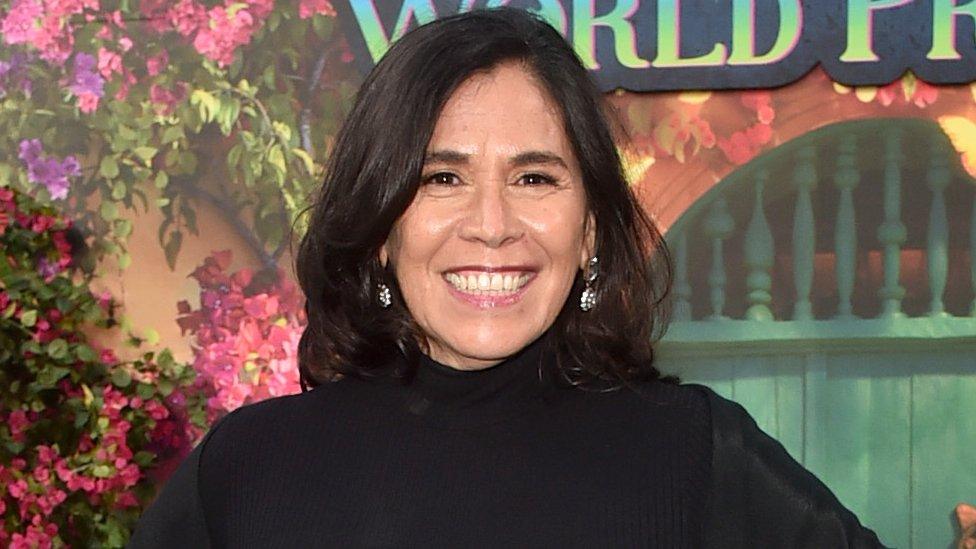
Germaine Franco could become the fifth woman to win the Oscar for best original score in 87 years
"The love of music brings me here… a Latina from El Paso, Texas, a drummer girl, composer, songwriter, lover of tunes and anything that makes noise."
That's how Hollywood composer Germaine Franco responded to the news that she had been nominated for an Oscar for best original score for Disney's latest hit animation, Encanto.
While the ubiquitous Lin-Manuel Miranda is responsible for every parent's favourite earworm We Don't Talk About Bruno and the film's numerous other catchy songs, it's Franco who is behind the magical score, which seamlessly blends with Miranda's work.
She is the first woman to score a Disney animated film, the first Latina to join the music branch of the Academy of Motion Picture Arts and Sciences, and the first to receive an Oscar nomination for best original score.
If she triumphs at Sunday's ceremony, she will be just the fifth female winner in 87 years.
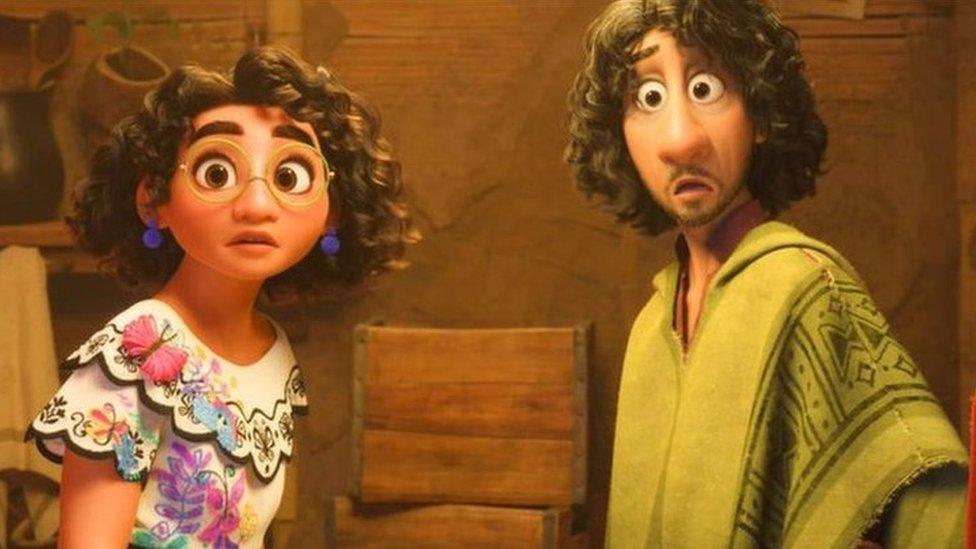
The film has a female protagonist, Mirabel, voiced by Stephanie Beatriz
Set in Colombia, Encanto is based around a family with fading magical powers who are battling to save their home. Franco has been thrilled with the film's reception, external and the soundtrack's chart-storming performance.
"The soundtrack is still sailing up there. The success is exciting, gratifying and so exhilarating. We've been going through this pandemic for so long... and to know that kids are enjoying it, and parents are enjoying watching their kids, that is really the best result we could hope for."
Franco's extensive back catalogue includes work on Coco, The Lorax and How to Train Your Dragon 2.
But it's Encanto and its Oscar buzz - the movie also has nominations for best original song (Miranda's Dos Oruguitas) and best animated feature - that has propelled her into the spotlight.
Miranda specifically asked for Franco to get on board, having heard her work on Coco.
Allow YouTube content?
This article contains content provided by Google YouTube. We ask for your permission before anything is loaded, as they may be using cookies and other technologies. You may want to read Google’s cookie policy, external and privacy policy, external before accepting. To view this content choose ‘accept and continue’.
"Every project is different. On this one, Lin had written most of the songs before I came on," she explains.
"My job is to make sure the score works with the existing songs and can weave in and out. And I was adding the orchestra to the songs. So the end of my score will always lead you to the very beginning of his song, harmonically. And that's why you don't really feel that there's a difference."
Franco wanted to bring an authentic Colombian sound - but that was a challenge given that she couldn't travel there due to the pandemic.
"I did my best to bring Colombia to me and imagine what it was like, and also I did a lot of research, listening to many, many hours of Colombian music from all genres and periods," she says. "Classical, indigenous, Afro Colombian... I also decided I must use the Colombian instruments."
They included a Colombian harp, a flute called a gaita, a marimba, external and some hand drums called tamboras.
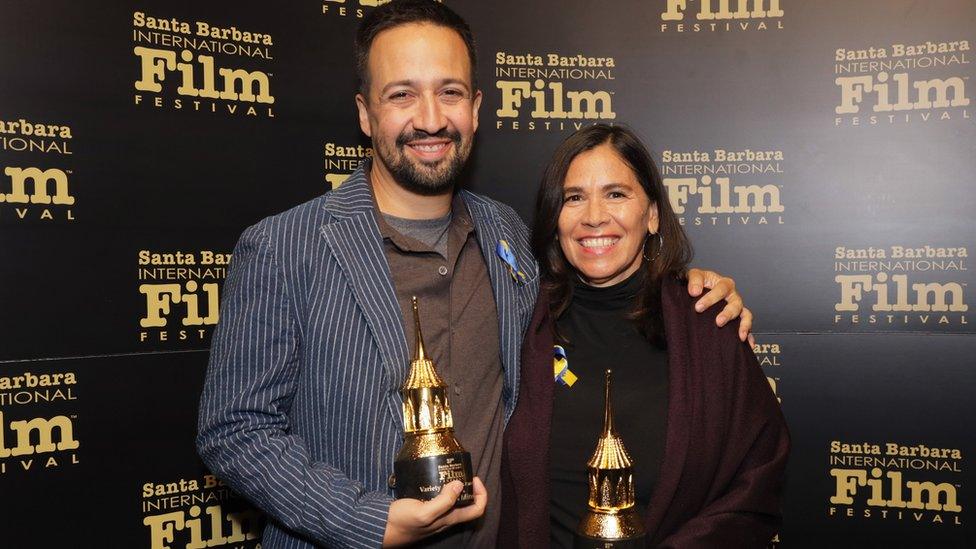
Miranda and Franco were rewarded at the Variety Artisans Awards earlier this month
"I just thought, this has to be rich. Women's voices are a big part of Colombian music. And so I actually had a 12-piece choir on the track Antonio's Voice, external.
"Those instruments tell a story about culture from thousands of years ago."
The score still has that familiar Disney feel, with its crashing crescendos, soaring strings and gentle playfulness.
"I've listened to Disney for so long, so I just I wanted to honour the sound of the classic Disney soundtrack while doing something different at the same time," Franco explains.
Allow YouTube content?
This article contains content provided by Google YouTube. We ask for your permission before anything is loaded, as they may be using cookies and other technologies. You may want to read Google’s cookie policy, external and privacy policy, external before accepting. To view this content choose ‘accept and continue’.
Her own musical journey began as a child in Texas. "I was just always that drummer girl, banging on stuff, as my mom would say.
"Nobody actually asked me to practice. I just would take the drums and sit at the piano. And I would just play for hours."
Later, she studied music and "really started learning about orchestras".
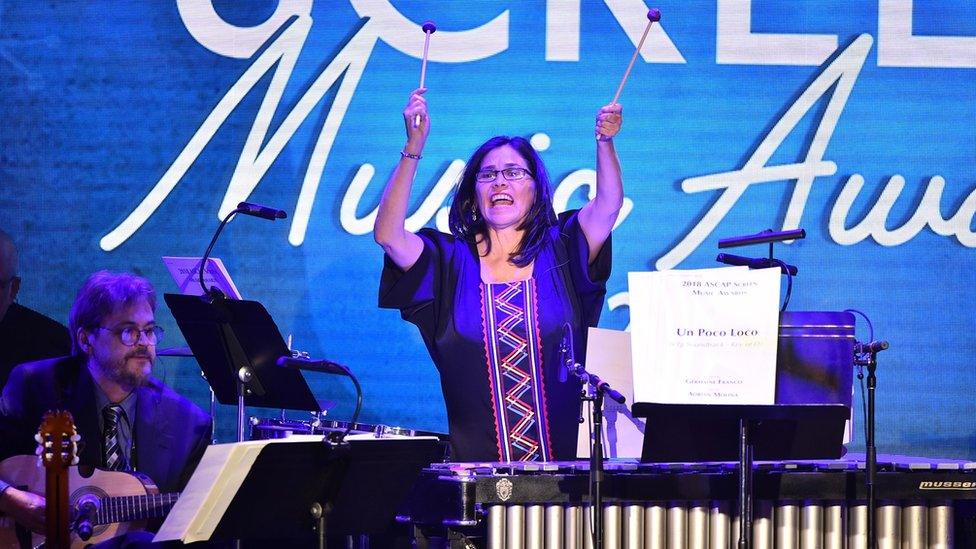
Franco (pictured here performing in 2018) also plays the marimba de chonta on the Encanto soundtrack
Franco began composing while at college, later writing for theatre before moving into film and TV.
According to the latest annual Celluloid Ceiling report, external published by Women in TV and Film, just 7% of the top 250 highest-grossing films featured a score written by a woman. That's a small increase on the 5% figure in 2020, while the previous two years both came in at 6%. So it's slow progress.

'They thought I couldn't handle it' - Being a female composer in Hollywood
Laura Karpman, who is currently writing The Marvels score, set up the the Alliance for Women Film Composers in 2014.
She says: "I think most sexism is deeply insidious. It creeps up on you. I noticed early on that my male colleagues were having much greater success than I was in traditionally large scale and big budget projects.
"At first I thought it was something that I had done, but I started to realise it was not me but merely the fact that I was not seen as somebody who could handle the larger projects, no matter how many times I clearly proved that I could."
But she adds: "Things are opening up. I am so delighted and in fact shocked that the advocacy work that we have all done is working. You see what happens when women are given the opportunities. They get Oscar nominations."
Rebecca Grierson, managing director at agency SixtyFour Talent, is the composer advocate for Free the Work, a talent initiative that aims to boost opportunities for under-represented groups.
She says: "There is implicit and unconscious bias when hiring people of colour. Couple this with sexism and it's a steep hill to climb.
"Film-makers can help by considering more diverse composer reels and not always hiring the 'safe' option for a composer. Taking risks on new or up-and-coming composers is necessary to level the playing field."
Fellow composer Dara Taylor also points out that award recognition is important.
"I believe that the common goal is for nominations such as these [Franco's] to become increasingly less historic and more commonplace," she says.

Franco says she is glad to be paving the way for others while also focusing on creating her best work.
"I feel happy to be in this place, to have other women and people of colour and just people who are different from the default composer to see they can can do it as well.
"I've gotten many, many letters and emails from women all over the world who are so happy this is happening. It's a positive moment. It inspires others to keep creating."
She notes that it's also important for people of colour to be offered more opportunities to work on all kinds of projects, not just ones related to their heritage.
"It depends on perception about your last name and what you look like - [the assumption] that you can only write certain types of music.
"I worked on Tag, which is a bro comedy, and Little, which is a black story of female power. I feel like now people are starting to remove the filter, but it is a concern that some composers of colour have felt that they don't get called for a certain type of film."
Franco says she tries to "just get to work" and "not think about the barriers".
But she acknowledges that "the barriers exist... they're changing but they're still there".
"I've had people come into my studio and say: 'Oh, did you study music?' The person that I was supposed to collaborate with asking me if I have a music degree!
"I've even had a journalist ask me if I've ever studied music and it's just, you know, jaw drop! There are those instances when you walk in and you're the only woman and people think you don't know the difference between, say, the type of recording resolutions."
She's philosophical about the state of play.
"Some people have their preconceived ideas... but I try not to focus on that too much because I want to focus on the positive. As artists, we just have to keep going.
"The answer is to keep putting out that body of work and then pretty soon people will see it."
And on her Oscar potential?
"I feel everything about this film has been a really great experience, anything else that happens... I'm considering it with gratitude."
Related topics
- Published9 February 2022
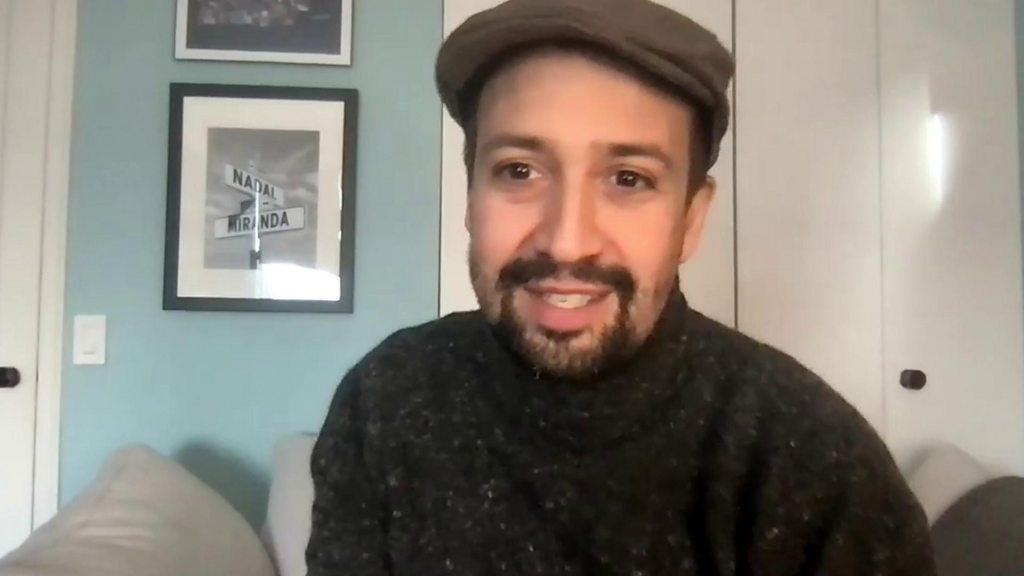
- Published8 February 2022
